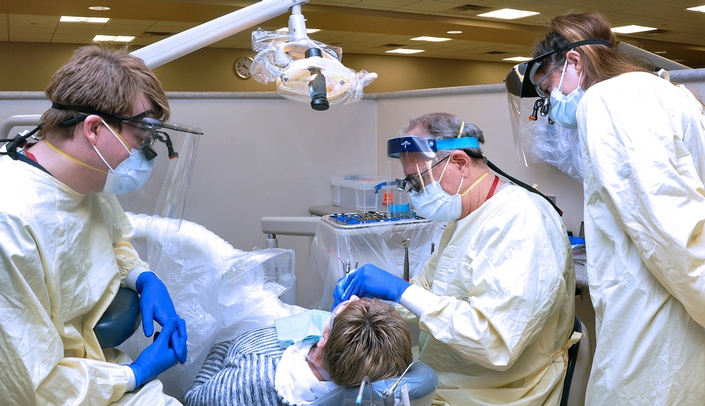The College of Dentistry’s hands-on clinical learning environment has presented the college with unique challenges during the COVID-19 pandemic. Traditionally, dental and dental hygiene students and residents build their clinical skills through treating approximately 70,000 patients annually in the college’s dental clinics and on extramural rotations. Before they treat patients, students have hands-on preclinical education in the college’s clinical and virtual simulation laboratory using cutting-edge learning technology.
With the onset of the pandemic limiting students’ hands-on clinical educational experiences, the college’s faculty, staff and students worked together to adapt the educational experience so students were able to continue their educational journeys without interruption.
Reenvisioning clinical education
On March 16, 2020, in response to a recommendation from the Nebraska Dental Association, the college halted routine dental care and faculty members and residents treated urgent and emergency patients. The college then worked to determine how students could continue their clinical learning experiences remotely.
During the first months of the pandemic, the College of Dentistry was the first dental school in the nation to purchase mobile dental handpieces and motors, called Optima units, that students used at home to continue building their clinical skills.
"The Optima units were incredibly helpful when we were learning remotely. We got the chance to practice crown preps for our board exam and were able to keep working on our hand skills with weekly restoration exercises," said Brooke Appelhans, a fourth-year dental student. "With the uncertainty of when we would be able to see patients again, I was so glad that the college provided us with a solution so that we could still get a clinical learning experience from home."
In April, the college formed a clinic reentry task force comprised of nearly 40 faculty, staff and students that worked to determine how to reopen the college’s clinics while keeping students, faculty, staff and patients safe.
The college partnered with the UNMC Infectious Disease department to create a clinical manual to use as a guide for treating patients during the pandemic and transformed the clinical environment and operations. This transformation included making changes in treatment approaches; making changes to clinic workflow, airflow, layout and scheduling; and redesigning the patient experience from the time a patient is contacted to the time they exit the college. Additionally, the college has utilized COVID-19 testing for certain dental procedures and has used the testing data to help drive further decisions on clinical operations and safety.
In May 2020, the Nebraska Dental Association recommended that routine dental care could resume. Shortly thereafter, the college’s students and residents began providing routine dental care in the college’s clinics. However, to comply with directed public health measures, the college was not able to reopen all their clinical spaces. Compared to a private dental practice, special provisions had to be made for the college’s large, open-bay dental operatories and the large number of faculty, staff, students and patients to ensure proper social distancing and other safety measures. Therefore, in order to offer students as many clinical educational experiences as possible, the college adjusted clinic times and started an evening clinic in October 2020. Additionally, when students are not in the clinics, they can practice their skills on the college’s new Simodont dental trainers which offer virtual reality training environments with 3D and haptics technology.
"The COVID-19 era of dental school is organized very differently compared to pre-COVID-19 times, and while it has expected drawbacks, I know the college is doing everything they can to provide us with the best experience possible," said Jai Mediratta, a fourth-year dental student. "Many of us are still getting near daily clinical experience and when we are not in clinic, we are able to use the Simodonts, a well-timed and innovative purchase by the college. The new normal is an adjustment for everyone, but at the end of the day, I feel confident I will graduate with the skills needed to be a competent clinician."
Other important successes
Due to the concerted efforts of dedicated faculty, staff and students, the College of Dentistry stands out nationally. A unique achievement among colleges was all 2020 dental and dental hygiene graduates finished their clinical educational requirements, graduated on time, and secured employment or started advanced education programs. Additionally, throughout most of the fall 2020 semester, all students had the opportunity for onsite didactic classes, 100% of students were onsite for lab classes and to treat patients, and first-year students had a 100% in-person classroom and hands-on educational experience.
"The College of Dentistry has gone above and beyond in adapting to the ongoing challenges of the COVID-19 pandemic. Faculty and staff have gone the extra mile to make sure that our education has not been impacted," said Nick Hofmaier, a second-year dental student. "Due to the college’s measures, we have been able to safely work in the clinical and virtual simulation lab, even outside of class time. This has allowed us to continue developing our clinical skills so we are ready to work with patients next semester."
The college has continued important oral health research and has modified community outreach activities so students can safely continue to participate in statewide oral health initiatives. Additionally, throughout the pandemic, the college has experienced growth in many areas: two educational programs increased enrollment; students started local chapters of the Student National Dental Association, American Association of Public Health Dentistry and UNMC Student Alliance for People of All Abilities; and the dental program received nearly 100 more applications than last year.
Importantly, the college has focused on making sure their close-knit community of students, faculty and staff stays connected.
"Even during these challenging times, the college has done the utmost to nourish the sense of community that makes the college so special," Nick said.
